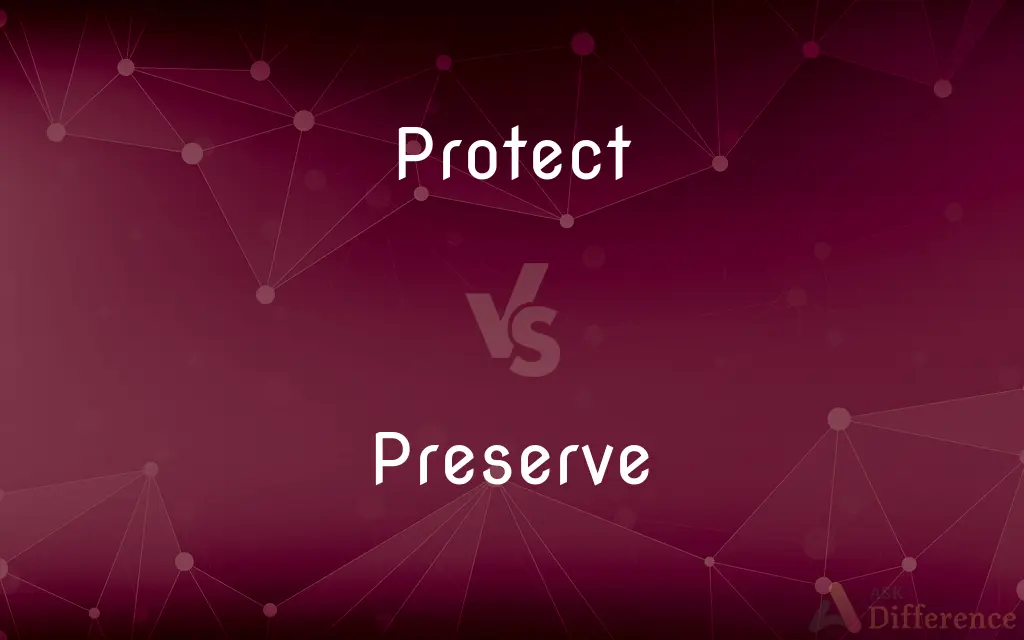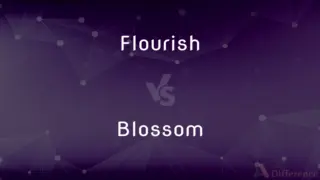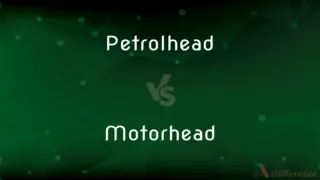Protect vs. Preserve — What's the Difference?
By Fiza Rafique & Urooj Arif — Updated on April 15, 2024
Protect involves shielding from harm or damage, often actively; preserve entails maintaining or keeping something in its original or existing state, focusing on long-term care.

Difference Between Protect and Preserve
Table of Contents
ADVERTISEMENT
Key Differences
To protect something typically implies safeguarding it from external threats or harm, often involving active measures. For example, protective gear like helmets or safety glasses are used to shield a person from physical injuries. On the other hand, to preserve something usually refers to maintaining or keeping an object, substance, or environment in its original or existing condition, often for future use or reference, like preserving historical artifacts or natural habitats.
Protection often requires immediate and sometimes temporary actions to prevent damage or injury. This can include anything from applying sunscreen to protect the skin from UV rays to implementing cybersecurity measures to protect data from theft. Conversely, preservation focuses on long-term maintenance and care, ensuring that something remains unaltered over time, such as preserving a species through conservation efforts or maintaining cultural heritage.
While protective measures are typically reactive or preventative in nature, aiming to shield against potential immediate threats, preservation strategies are proactive, planning for the long-term sustainability of resources, environments, or cultural values. For example, protecting a wetland might involve erecting barriers to prevent pollution, whereas preserving it involves ongoing ecological management to maintain its natural state.
The goal of protection is often to allow something to continue to function or exist despite adverse conditions, like protecting endangered animals from poachers. In contrast, the aim of preservation is to maintain the status quo and prevent any change or decay, such as preserving foods with techniques like freezing or canning.
Protection is about defending or shielding from harm, often with an immediate focus, whereas preservation is about maintaining or keeping safe over time, with an emphasis on the original state and long-term care.
ADVERTISEMENT
Comparison Chart
Focus
Defense against harm
Maintenance of existing state
Nature
Often active and immediate
Long-term and proactive
Examples
Use of antivirus software, sunscreen
Canning food, maintaining historical buildings
Intent
To prevent damage or ensure safety
To keep something unchanged over time
Applications
Safety equipment, security measures
Conservation efforts, archival methods
Compare with Definitions
Protect
To prevent something from being affected.
He applied a sealant to protect the wood from moisture.
Preserve
To sustain an ecological or environmental area.
National parks help preserve wildlife habitats.
Protect
To safeguard rights or well-being.
Laws exist to protect consumer privacy.
Preserve
To maintain in its original or existing state.
The museum preserves ancient artifacts.
Protect
To defend or guard from harm or danger.
She wears gloves to protect her hands.
Preserve
To save from change or loss.
Efforts are made to preserve traditional crafts.
Protect
To shield something from adverse conditions.
The levee protects the town from flooding.
Preserve
To maintain continuity of a cultural practice.
Festivals help preserve community traditions.
Protect
To apply measures preventing damage.
Installing smoke detectors protects against fire risks.
Preserve
To keep safe from decay or damage.
She uses preservatives to keep the food fresh.
Protect
To keep from being damaged, attacked, stolen, or injured; guard.
Preserve
To keep from injury, peril, or harm; protect.
Protect
To keep from being subjected to difficulty or unpleasantness
A mother who wanted to protect her children from the troubles she had seen when growing up.
Preserve
To keep in perfect or unaltered condition; maintain unchanged
Fossils preserved in sediments.
A film preserved in the archives.
Protect
To keep from being curtailed or exposed to risk
The reporter vowed to protect the privacy of his sources.
Preserve
To keep or maintain intact
Tried to preserve family harmony.
Protect
To help (domestic industry) with tariffs or quotas on imported goods.
Preserve
To prepare (food) for storage or future use, as by canning or salting.
Protect
To assure payment of (drafts or notes, for example) by setting aside funds.
Preserve
To prevent (organic bodies) from decaying or spoiling
Preserved the specimen in a chemical solution.
Protect
(Sports) To attempt to hold (a lead) by playing careful defense and avoiding risky plays.
Preserve
To protect (wildlife or natural resources) in a designated area, often for regulated hunting or fishing.
Protect
To swing at a pitch near (home plate) in order to avoid being called out on strikes.
Preserve
To maintain (an area) for the protection of wildlife or natural resources.
Protect
To swing at a pitch so as to give (a base runner) a better chance of advancing.
Preserve
To treat fruit or other foods so as to prevent decay.
Protect
To book a passenger on a later flight if there is a chance they will not be able to board their earlier reserved flight.
Preserve
To maintain an area for the protection of wildlife or natural resources.
Protect
To cover or shield from danger or injury; to defend; to guard; to preserve in safety; as, a father protects his children.
The gods of Greece protect you!
Preserve
Something that acts to preserve; a preservative.
Protect
Shield from danger, injury, destruction, or damage;
Weatherbeater protects your roof from the rain
Preserve
Often preserves Fruit cooked with sugar to protect against decay or fermentation.
Protect
Use tariffs to favor domestic industry
Preserve
An area maintained for the protection of wildlife or natural resources.
Preserve
Something considered as being the exclusive province of certain persons
Ancient Greek is the preserve of scholars.
Preserve
A sweet spread made of any of a variety of fruits.
Preserve
A reservation, a nature preserve.
Preserve
An activity with restricted access.
Preserve
To protect; to keep from harm or injury.
Every people have the right to preserve its identity and culture.
Preserve
To save from decay by the use of some preservative substance, such as sugar or salt; to season and prepare (fruits, meat, etc.) for storage.
To preserve peaches or grapes
Preserve
To maintain throughout; to keep intact.
To preserve appearances; to preserve silence
Preserve
To keep or save from injury or destruction; to guard or defend from evil, harm, danger, etc.; to protect.
O Lord, thou preserved man and beast.
Now, good angels preserve the king.
Preserve
To save from decay by the use of some preservative substance, as sugar, salt, etc.; to season and prepare for remaining in a good state, as fruits, meat, etc.; as, to preserve peaches or grapes.
You can not preserve it from tainting.
Preserve
To maintain throughout; to keep intact; as, to preserve appearances; to preserve silence.
Preserve
To make preserves.
Preserve
To protect game for purposes of sport.
Preserve
That which is preserved; fruit, etc., seasoned and kept by suitable preparation; esp., fruit cooked with sugar; - commonly in the plural.
Preserve
A place in which game, fish, etc., are preserved for purposes of sport, or for food.
Preserve
A domain that seems to be specially reserved for someone;
Medicine is no longer a male preserve
Preserve
A reservation where animals are protected
Preserve
Fruit preserved by cooking with sugar
Preserve
Keep or maintain in unaltered condition; cause to remain or last;
Preserve the peace in the family
Continue the family tradition
Carry on the old traditions
Preserve
Keep in safety and protect from harm, decay, loss, or destruction;
We preserve these archeological findings
The old lady could not keep up the building
Children must be taught to conserve our national heritage
The museum curator conserved the ancient manuscripts
Preserve
To keep up and reserve for personal or special use;
She saved the old family photographs in a drawer
Preserve
Prevent (food) from rotting;
Preserved meats
Keep potatoes fresh
Preserve
Maintain in safety from injury, harm, or danger;
May God keep you
Preserve
Keep undisturbed for personal or private use for hunting, shooting, or fishing;
Preserve the forest and the lakes
Common Curiosities
Why is food preservation important?
It extends the shelf life of food and helps prevent food waste.
What does it mean to protect an ecosystem?
To safeguard it from external threats like pollution or exploitation.
Can preservation include restoration?
Yes, preservation can include restoring an item or place to maintain its historical significance.
What is protective legislation?
Laws designed to shield individuals, groups, or resources from harm or exploitation.
What are common methods of protection in sports?
Wearing gear like helmets, pads, or guards to prevent injuries.
Can protective measures ever be harmful?
Yes, if not well-managed, they can restrict natural behaviors or lead to unintended consequences.
How does one preserve historical documents?
By controlling environmental conditions such as temperature and humidity to prevent deterioration.
What is the relationship between protecting and preserving the environment?
Protecting the environment often involves defending it from immediate threats, while preserving involves maintaining its natural state for the future.
What are some examples of protective technologies?
Firewalls, antivirus software, and encryption are technologies that protect against cyber threats.
How does one preserve digital data?
Through backups, use of stable storage media, and managing data integrity.
How do museums preserve art?
By using controlled environments and specialized preservation techniques.
Share Your Discovery

Previous Comparison
Flourish vs. Blossom
Next Comparison
Petrolhead vs. MotorheadAuthor Spotlight
Written by
Fiza RafiqueFiza Rafique is a skilled content writer at AskDifference.com, where she meticulously refines and enhances written pieces. Drawing from her vast editorial expertise, Fiza ensures clarity, accuracy, and precision in every article. Passionate about language, she continually seeks to elevate the quality of content for readers worldwide.
Co-written by
Urooj ArifUrooj is a skilled content writer at Ask Difference, known for her exceptional ability to simplify complex topics into engaging and informative content. With a passion for research and a flair for clear, concise writing, she consistently delivers articles that resonate with our diverse audience.














































